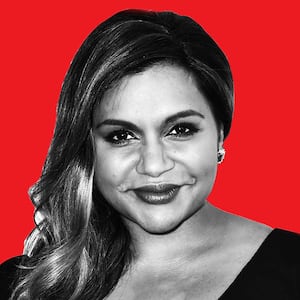Subscribe to The Last Laugh on Apple Podcasts
Andrea Savage knows she’s a great podcast guest. “Not to brag,” she says towards the beginning of our conversation for this week’s episode of The Last Laugh.
Now Savage, who created and stars in the exceptional sitcom I’m Sorry, has a podcast of her own. It’s called Andrea Savage: A Grown-Up Woman #buttholes and it finds the comedian chatting about adulthood with industry friends like Paul Rudd, Mila Kunis and Jon Hamm, who recently read aloud from her teenage diary. It was the entry from the day after she lost her virginity and Savage says it was the most embarrassing experience of her life. She could have edited it out, but didn’t because she knew how much listeners would love it.
This commitment to cringe-worthy comedy without any sense of malice is also what makes I’m Sorry one of the funniest and most delightful shows of the past decade. On the series, which will premiere its third season on truTV later this year, Savage plays a thinly veiled version of herself. Andrea Warren is a comedian raising a child with her non-comedian husband in Los Angeles. Much of the comedy comes out of her well-intentioned but disastrous attempts to explain the world to her young daughter and the deliciously awkward encounters she has with fellow parents who don’t always appreciate her dirty sense of humor.
On this week’s episode, we discuss how Savage got to be the “dirty and weird and funny and sexual” grown-up she is today, starting out in The Groundlings comedy troupe, through key roles in films like Step Brothers and shows like Episodes, Veep and Curb Your Enthusiasm, to her most rewarding and personal projects to date.
Highlights from our conversation are below and you can listen to the whole thing right now by subscribing to The Last Laugh on Apple Podcasts, the Himalaya app or wherever you listen to podcasts.
Why she called her podcast ‘Andrea Savage: A Grown-Up Woman #buttholes’
“I get a lot of responses where people are like, I watch your show [I’m Sorry] and it makes me not scared to grow up. It looks like you can still have fun. It looks like you can be a grown-up and still be dirty and weird and funny and sexual. And I really took that to heart. I was scared to grow up. A lot of people are. But you don’t have to change. I have a lot of friends who are like me and everyone who watches my show are still cool, normal people. So the whole point of the podcast is to show that you’re a grown-up but you don’t have to take yourself so seriously. To me, ‘butthole’ is just one of my favorite words. And you can’t act super serious and say the word butthole. It’s literally impossible. It is a magic word.”
How Netflix became a ‘game changer’ for ‘I’m Sorry’
“It was night and day. I mean, we had great, die-hard fans from the beginning and it was very well-received. But it was truTV and everyone was like, ‘Do I get truTV?’ I promise you do, it’s the most basic of basic cables, but I didn’t even know what truTV was before. And then suddenly it went on Netflix and then just exploded overnight. We sort of got the benefit of both ways the show could be released. Because we get the weekly, everyone waits for it and then they can focus on it and talk about it and it’s not just all gone where you’ve spent 14 months of your life and within five hours it’s all been binged—we get that and then we get another boost when it comes out on Netflix.”
On finding the balance in cringe-worthy comedy
“We don’t ever really shit on anybody. Even though the show has an edge, it’s all very good-natured. We don’t ever take people down. And we’re not ever being dicks to someone or being a monster. So that’s why I think the ‘cringe’ moments aren’t like, ‘Ugh, I can’t.’ Because it’s not me being shitty to someone and saying something that’s really going to hurt them. It’s uncomfortable but it’s not mean. We’ve made a conscious choice on this show to not be dark and mean. But we also have no heart. Because I believe the heart is in the banter of giving my husband shit and fucking with my mom. That’s the way I show affection in my life. In my life, there’s never a moment where it’s like, ‘You know what? I really appreciated you being there. I love you.’”
On facing sexism as part of The Groundlings comedy troupe
“Ultimately I was cut from the Sunday Company and did not make it into the Main Company, which was very hard—very hard on the ego, very frustrating. And I didn’t think [it was] merited. And it was at a time when women were having a really tough time there. There were about four votes in a row where women were cut and no women were moved up. And especially if you’re not quirky—if you were somewhat of a cute girl, you were going to have a rough go. And I was cut. Kaitlin Olson was cut. A bunch of us were cut in a row. And then eventually it kind of pulled itself together a little bit. And it hurt. It sucked. It was like being thrown out of a cult that you don’t want to be thrown out of. It’s where you’ve been for four or five years every day and then suddenly you’re just ousted out into the world. But I think it was the best thing that ever happened to me because I worked less professionally in the Groundlings than any other time in my career.”
Next week on The Last Laugh podcast: The Good Place creator Mike Schur.








